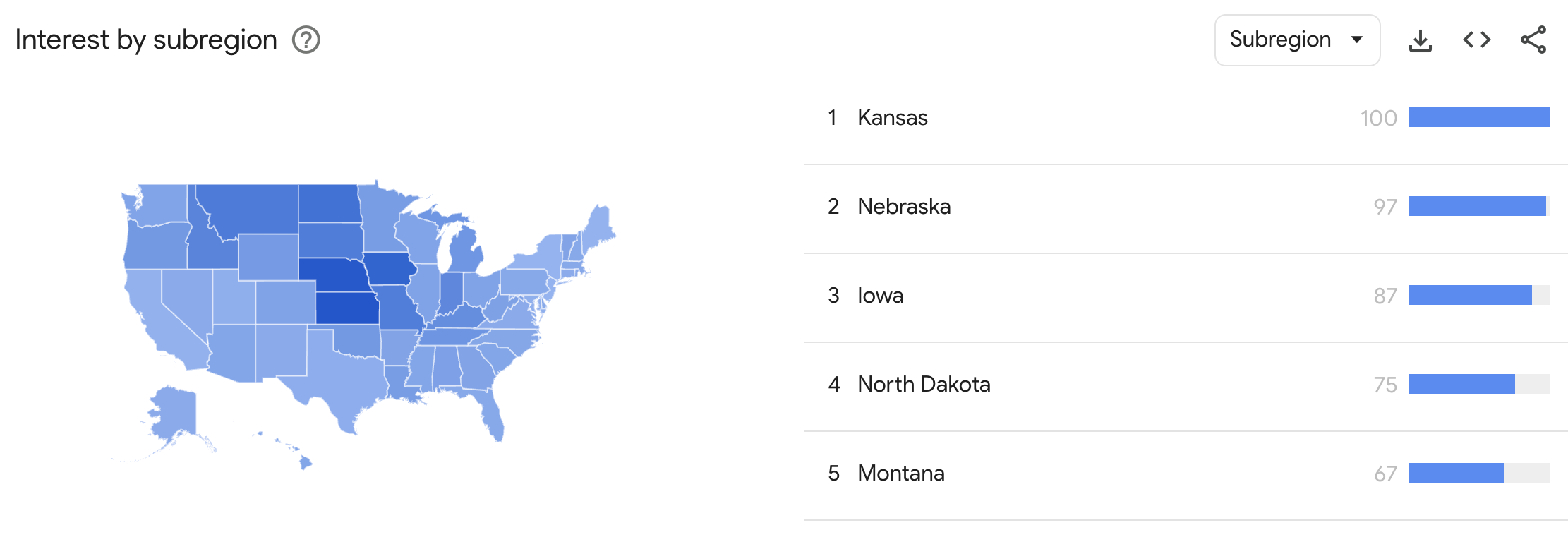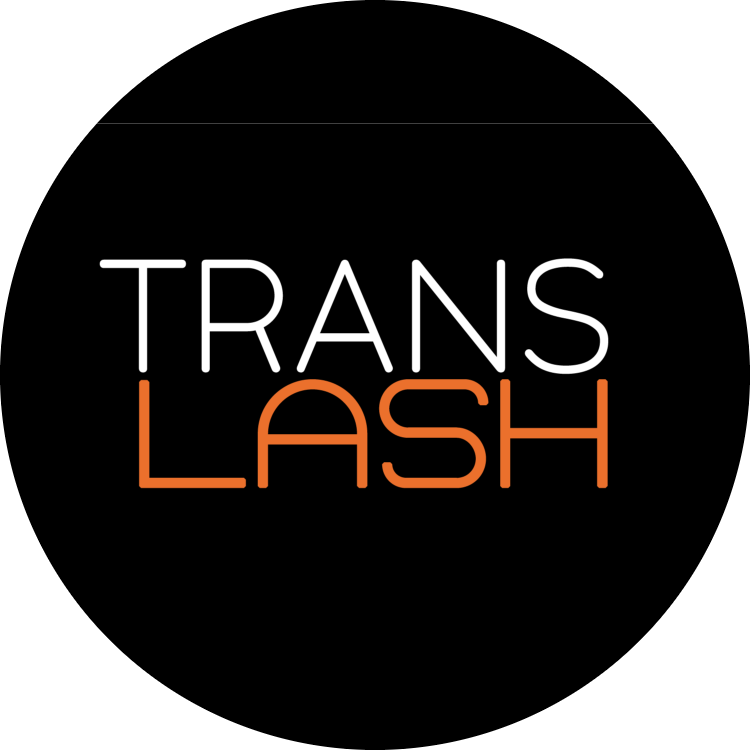By Oliver Whitney and Daniela “Dani” Capistrano
On Monday, April 8, the National Association of Intercollegiate Athletics (NAIA) delivered the latest piece of transphobic policy in athletics by banning transgender women from women’s sports. This marks the first time a national organization has made sex assigned at birth a requirement for participation in sports, as athlete Chris Mosier pointed out in his response on Instagram.
So why were 5 states actively Googling “NAIA” last week? Let’s get into it.

How the NAIA’s Anti-Trans Sports Ban Impacts These Key States
The National Association of Intercollegiate Athletics (NAIA), which is made up of 241 small colleges and universities across the country, announced a new policy stating “only NAIA student-athletes whose biological sex is female may participate in NAIA-sponsored female sports.”
The NAIA further admitted it had “no knowledge of transgender athletes competing in its postseasons to this point,” per CBS Sports, suggesting this ban was the result of political pressure.
While this news is a painful blow to trans and gender nonconforming communities across the country, it seems to be of special interest to residents of five states:

Kansas, Nebraska, Iowa, North Dakota, and Montana were among the top states that Googled the “National Association of Intercollegiate Athletics”/”NAIA” in the week following the announcement, according to Google Trends.
As it turns out, four of those states already have anti-trans sports bans, and one has had a ban introduced in its state legislature; specifically, all five states have anti-trans sports bills either in place or introduced in their legislatures.
NAIA’s new policy will now worsen conditions for trans athletes in four of those states.
How North Dakota, Kansas, Nebraska, and Montana Are the Most Impacted
While the NAIA policy might not make a difference to trans athletes already facing sports bans in Iowa, it certainly will have devastating impacts on the four other states that turned to Google to research the NAIA over the past week.
North Dakota and Kansas
In both North Dakota and Kansas, trans women and girls are currently barred from women’s sports:
In 2023, North Dakota’s Republican Gov. Doug Burgum signed a bill into law that restricts transgender health care in the state, immediately making it a crime to give gender-affirming care to people younger than 18. He also signed a transgender athlete ban into law after it similarly passed the House and Senate with veto-proof majorities.
Additionally in 2023, the Kansas Legislature overrode Gov. Laura Kelly’s third veto in three years of a bill to ban transgender athletes, and came a day after state lawmakers passed a broad bathroom bill.
There are five NAIA colleges in North Dakota, while Kansas has a whopping 15, making both states especially worrisome places for trans and gender nonconforming folks hoping to join men’s sports teams and take HRT — and, ideally, do both of those things freely and privately.
The news of NAIA’s policy will likely be especially upsetting for transmasculine athletes in those states who may undergo or are currently taking HRT.
Montana
Transmasc athletes in Montana will now face similar limitations at the state’s six NAIA schools. But the bad news, unfortunately, doesn’t end there. Currently Montana prevents trans women and girls from women’s sports in K-12 only, due to a court order that ruled higher education bans unconstitutional. That’s no longer the case for trans female athletes who will now be barred from women’s athletics at Montana’s NAIA colleges.
While there may be no new anti-LGBTQ legislation in Montana and North Dakota so far this year, the former is facing a near ban on changes to birth certificates, while a North Dakota gender-affirming care ban for youth remains held up in court.
Nebraska
The ramifications of the new policy are most infuriating, however, when we look to Nebraska:
Earlier this month trans Nebraskans celebrated a major victory when a bill that sought to ban trans folks from sports, bathrooms, and locker rooms was found triumphantly dead on the legislative floor, according to the AP. But that incredible news has now been eclipsed by the NAIA’s transphobic decision, which will impact athletes at the state’s eight NAIA-affiliated schools.
It’s not hard to understand why these five states Google searched the NAIA the most — nearly all of them remain a hotbed of anti-trans legislative hate.
Allyship Matters
There is growing concern that NAIA’s decision could spiral into something worse by putting pressure on the NCAA to follow suit with their own anti-trans sports ban. Regardless of what happens, we can only hope that more vocal allies like Dawn Staley — the South Carolina Gamecocks coach who recently voiced her support for trans female athletes — continue to join us in fiercely defending trans rights.
It’s clear that trans folks and their families in Kansas, Iowa, Nebraska, Montana, and North Dakota are in a constant state of panic as their survival and safety remains threatened under existing transphobic laws, not to mention whatever future ones pass now through May or re-emerge in 2025.
Why NAIA’s Decision Has Nationwide Implications
There are currently 24 states nationwide that ban transgender girls and women from participating in women’s sports, including Iowa, North Dakota, Montana, and Kansas. The latter has been one of the most contentious, with Kansas Gov. Laura Kelly notably rejecting such sports bills in the past. The Republican-controlled legislature voted to override her 2023 veto, banning trans female athletes in kindergarten through college.
It’s far from a surprise to see Kansas ranked as the top state Googling the NAIA given this history, but the state is facing even more horrific legislation this session with 16 anti-LGBTQ bills, according to the ACLU’s Tracker.
The most alarming is a ban on gender-affirming health care for trans youth that’s already passed and is awaiting signage from the Governor.
In Iowa, trans athletes have been banned from participating in sports aligned with their gender identity since 2022.
Among the 34 anti-LGBTQ bills the ACLU is tracking so far this year, one has been dubbed the “LGBTQ erasure” bill, which would require trans and nonbinary Iowans’ sex assigned at birth to be listed on new birth certificates and ID cards.
How NAIA’s Anti-Trans Sports Ban Impacts Transmaculine Athletes

The new anti-trans policy allows all athletes to participate in men’s sports, however there’s limitations for trans men and gender nonconforming folks who have “begun masculinizing hormone therapy,” per the policy. In a clear violation of privacy, NAIA institutions are required to notify the association’s national office if they have an athlete who has “begun masculinizing” HRT.
The reasons for reporting that personal information remain unclear, along with what the NAIA means by “begun” HRT. What about someone who’s started and stopped HRT treatment, intersex folks undergoing HRT, or even cisgender male athletes on TRT?
One could poke holes in this inane classification of transness and medicalization endlessly.
NAIA Defense: Trans-Affirming Resources
While all LGBTQ Americans could be impacted by the aftermath of the NAIA’s transphobic policy decision, here are some trans-affirming resources in Iowa, Kansas, Montana, Nebraska, and North Dakota:
Iowa:
- ➤ The Iowa Trans Mutual Aid Fund distributes financial assistance to trans and non-binary individuals in Iowa for access to gender-affirming care.
- ➤ Iowa Safe Schools is an advocacy organization that provides support, victim services, resources, and events for LGBTQ youth, as well as educators, administrators, and the families and community members of LGBTQ youth.
- ➤ UCS Healthcare in Des Moines offers free transgender support groups for trans adults, trans teens, and for parents and partners of trans folks.
- ➤ One Iowa is an education and advocacy nonprofit that connects transgender Iowans to healthcare, support and social groups, and legal services, and features a list of local trans resources on their website.
- ➤ Aime Wichtendahl: elected to the Hiawatha, Iowa, City Council in 2015. She is the first openly trans woman elected to government in Iowa and she is running for the Iowa House of Representatives:
Kansas:
- ➤ The Center of Wichita offers a support group for LGBTQ+ youth and their families, a meeting space LGBTQ+ groups, and a growing LGBTQ+ library, and resources for other LGBTQ+ organizations across the state.
- ➤ Our Spot KC is a hub for resources that support, advance and equip LGBTQ+ individuals including programs such as Lion House, a transitional and rapid rehousing program, and a food truck meal program.
- ➤ Gender Pathway Services at the Children’s Mercy Hospital in Kansas City, KS offers family-centered services for transgender and gender-questioning children.
- ➤ Stephanie Byers: elected to the Kansas House of Representatives. She is the first openly trans woman of color to serve in and to be elected to a state legislature and the first Native American trans person to hold elected office in the United States (January 11, 2021 – January 9, 2023).
Montana:
- ➤ TransVisible Montana is a coalition of TGNC2S individuals and organizations who provide workshops, leadership opportunities, education, and more across the state.
- ➤ TransClosetMT is a trans-run mutual aid resource based in Bozeman, MT offering free gender-affirming clothes, shoes, and undergarments for trans+ folks across the state.
- ➤ The Center is western Montana’s LGBTQ+ space that offers a live chat space for LGBTQ+ teens, a weekly trans, intersex, & nonbinary group, a library, a queer clothing closet, and more.
- Zooey Zephyr: State Representative out of Missoula, Montana, elected to the 100th District of the Montana House of Representatives. She is the first openly transgender elected official in the Montana Legislature (January 2, 2023 – present).
Nebraska:
- ➤ Panhandle Equality is a nonprofit that advances LGBTQ+ rights in the Nebraska Panhandle, and offers a Transgender-Care Fund for costs related to transitioning and a free community clothing closet.
- ➤ Trans Stichin’ is a free closet of gender-affirming clothing in Omaha, and offers a list of local trans-affirming mental health professionals on their website.
- ➤ TransNebraska is a branch of the ACLU of Nebraska that offers a list of community resources, such as support groups and health resources, and information on name and gender marker changes.
- ➤ Jay Irwin: Faculty member @UNOmaha and a medical sociologist specializing in LGBTQ+ health & trans identities.
- In May 2023, Nebraska State Sen. Megan Hunt responded to one of her colleagues, Republican Sen. Lou Ann Linehan, who complained that the filibuster attempts to stop gender-affirming care and abortion bans caused her to miss events like her grandson’s school graduation:
North Dakota:
- ➤ Harbor Health Initiative is a former gender-affirming care clinic that now offers support with name and gender marker changes, connections to trans-affirming medical providers, and more.
- ➤ Trans-portation ND is a Facebook group that raises funds to buy gas cards to be donated and distributed to the families of young trans and nonbinary people in North Dakota.
- ➤ ACLU of North Dakota
- ➤ Dakota OutRight works to improve the lives of LGBTQIA2S+ people in Central North Dakota through connection, visibility, & advocacy.
Learn more about trans athletes on TransLash Podcast with Imara Jones:
Did you find this resource helpful? Consider supporting TransLash today with a tax-deductible donation.


